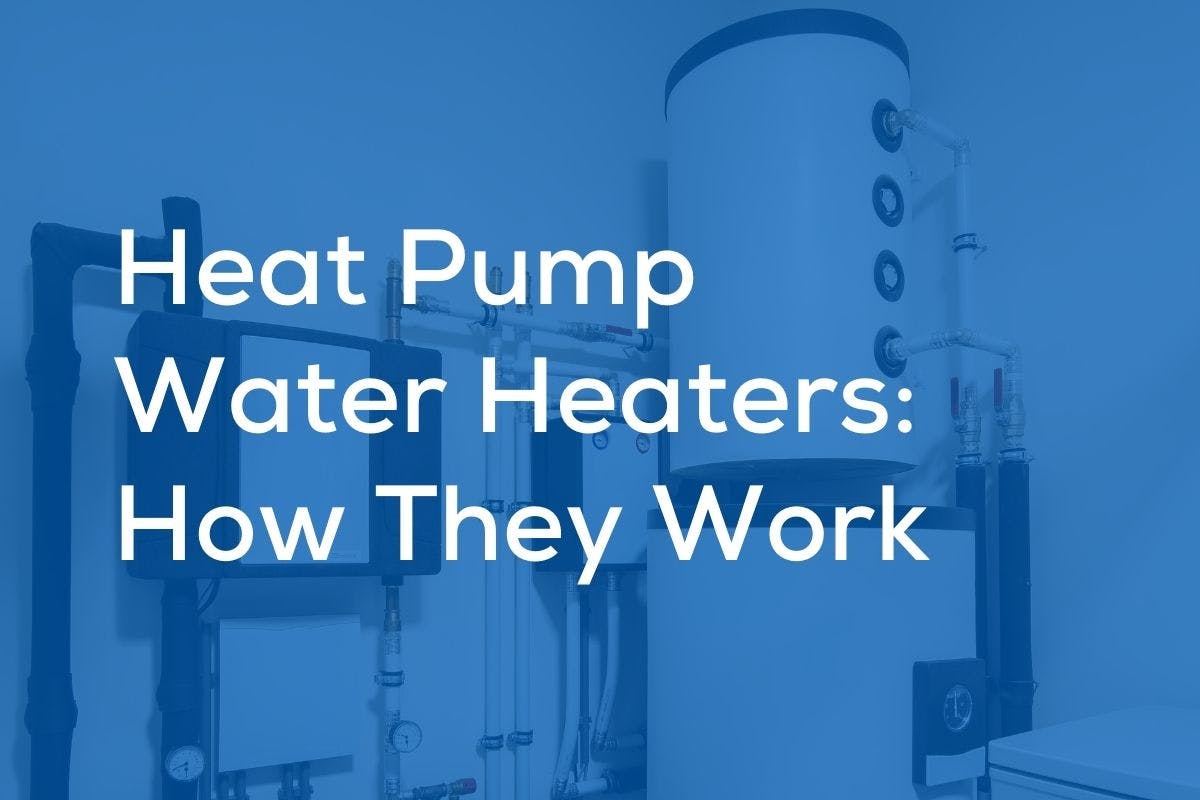Many people have a heat pump for their home heating and cooling. The same technology is available and may be a great idea for water heating.
The average US home spends about $400-$600 a year on water heating, which can account for 20% or more of its utility bill. Heat pump water heating or a combination heat pump system for HVAC and water can save hundreds of dollars a year in energy costs.
See how much you can save with home energy changes
What Is a Heat Pump Water Heater?
A heat pump water heater pulls heat from the surrounding air and sends it via refrigerant to a water storage tank. They are electric but use electricity to move heat, not generate it. Energy Star-certified heat pump water heaters use about 70% less energy than conventional electric water heaters.
A heat pump water heater may be a standalone system or combined with a heat pump for space heating and cooling, which may be the most energy-efficient solution for your home.
How a Heat Pump Water Heater Works
A heat pump water heater works the same way an HVAC heat pump does, or like a refrigerator but in reverse.
The heat pump’s fan pulls in air, which is moved across evaporator coils containing refrigerant gas. The now-warmer refrigerant passes through a compressor to increase its pressure and temperature. Now very hot, the refrigerant passes through condenser coils around or inside the water tank. The heat transfers to the water and the cooled refrigerant goes back to the evaporator coils. More air is drawn in, starting the cycle again.
A heat pump water heater must be installed where the air temperature around it is 40-90 degrees Fahrenheit year-round, though manufacturers’ recommendations will vary. Typically, a heat pump water heater is installed in a basement, garage, utility room, or laundry room. It can also be put near a furnace, where warmer air can be pulled in, making it more efficient.

Credit: Energy Star
Heat Pump Water Heater Costs
A heat pump water heater's upfront purchase and installation costs are typically more than a conventional water heater's. In the long run, energy savings should make up and surpass the difference. Energy Star-certified heat pump water heaters save a family of four an estimated average of $550 a year compared to a standard water heater.
A standard electric water heater with a 50-gallon tank costs, on average, from $500 to $2,100 and the installation cost ranges from $700-$1,800 according to our survey of retail and consumer sources.
Heat pump water heaters range from $1,200-$3,000 for the purchase and $1,000-$3,500 for installation according to retail, consumer, and government sources. The water heater’s size, local labor costs, and extra construction or components needed affect the price. Rebates, tax credits, and incentive programs can cut the initial cost with approved, energy-efficient water heaters.
If you save $550 annually, as Energy Star estimates the average family will, you could recoup the extra upfront cost in a few years. (Your savings may vary.) Heat pump water heaters have an estimated lifespan of 13-15 years.
Incentives and tax credits for heat pump water heaters
Heat pump and conventional electric water heaters may qualify for tax credits through the Energy Efficient Home Improvement Credit and the Home Efficiency Rebate.
The Energy Efficient Home Improvement Credit is a federal tax credit of up to 30% of approved energy-efficient appliances' purchase or project cost, up to $2,000 for a heat pump water heater and $600 for a conventional water heater. Many home appliances are eligible for energy efficiency tax credits. A tax credit reduces the taxes you owe or increases your tax refund in a given tax year. If you have a tax liability smaller than the allowable credit, you won’t be able to claim the difference, and you can’t roll it into the next tax year. To file the Energy Efficient Home Improvement Credit, you’ll need IRS Form 5695.
In states that have already implemented the Home Efficiency Rebate, new conventional and heat pump water heaters may be eligible. This program rebates up to $8,000 for home projects that reduce residential energy consumption by a certain percentage. Programs and eligibility may vary by state.
See how much you can save with home energy changes
Heat Pump Water Heater Pros and Cons
Heat pump water heaters have pros and cons compared to other water heating systems you may be more familiar with or have in your home.
Pros
- Efficiency: Energy efficiency means saving money, especially over the long run.
- In-home environment: A properly working heat pump water heater gives off no emissions, gas, or toxic exhaust, which benefits your home air quality. There is virtually no fire risk.
- Climate: Heat pump water heaters use less energy, produce fewer carbon emissions, and have a smaller carbon footprint than other water heaters. Replacing an old water heater with a heat pump water heater can avoid about 12 tons of CO2 over its lifetime, which is the same as growing 198 new trees for 10 years.
- Lifespan: Conventional water heaters generally last 10-12 years. Heat pump water heaters last about 13-15 years, potentially extending the savings from efficiency after the initial upfront costs.
- Incentives: Federal, state, and local incentives, such as tax credits and rebate programs, may reduce the cost and increase the savings of a new heat pump water heater.
- Quiet: Heat pump water heaters run nearly silently. This makes installing one in a basement or utility room fine, even if it’s close to a bedroom, living room, or office.
Cons
- Upfront cost: The initial expense of purchasing and installing a heat pump water heater, compared to a conventional water heater, is typically higher.
- Added installation needs: If you’re going to a heat pump water heater for the first time, the system may need additional venting, electrical connections, and components. This could mean added labor time and costs.
- Space needs: While a heat pump water heater is flexible in where it can go in a home, it needs enough space for a condensation drain and good airflow.
When to Get a New Water Heater
Besides total failure, when should someone consider getting a new water heater? There are signs it’s time for a new water heater and signs an upgrade or more efficient system may be the right call.
Signs your water heater’s done
- No or not enough hot water
- Waiting for hot water more frequently
- Inconsistent temperatures
- Nearing the end of its expected lifespan
- Rusty or dirty-colored water
- Leaks from tank or components
- Low or inconsistent water pressure
- Strange sounds
- Pilot light going out (gas heaters only)
Reasons to upgrade
- Your demand for hot water changes
- Home electrification
- Switching from gas to electric before or after going solar. If you have your own clean, renewable, independent electrical power, it makes sense to maximize your usage of it
See what home electrification can do for you:
Buying Considerations for Heat Pump Water Heaters
If you’ve never bought a water heater, you might not know what to look for. Your budget, of course, is always a main factor. Size, compatibility with a spot in your home, energy efficiency, and how fast it cranks out hot water are other specs you might take into account.
Capacity
It’s possible to get a water heater that’s too small — a system capacity of 50 gallons is pretty standard. It’s also possible to get a water heater that’s oversized for your needs, but it will be too expensive and inefficient.
First Hour Rating
In addition to the actual capacity, you should also factor in the First Hour Rating (FHR). FHR is the number of gallons of hot water the system produces in the first hour of use. It combines tank capacity, heating efficiency, and heating speed. Energy Guide labels have the FHR and the estimated annual energy cost.
You can take the busiest time for hot water usage in your home, typically the morning rush before work and school or the evening, and figure out the FHR to fit your water usage. A shower uses an average of 20 gallons of hot water, a dishwasher uses an average of seven gallons, and washing a load of laundry (on a hot water cycle) takes about 25 gallons.
Location
Knowing whether you have the space to install a heat pump water heater is an important factor. You’ll need to make sure you have the space, airflow, and drain or pump compatibility for it.
Incentives
Finally, a new water heater’s eligibility for tax credits and rebates could cut thousands off the upfront cost.
If you’re switching to a heat pump water heater as part of a home electrification project or to save energy and money, home solar panels could be worth adding to your plans, too. You can start with Palmetto’s solar savings calculator or our contact form.
See what home electrification can do for you:
Frequently Asked Questions
Is a heat pump water heater worth it?
In many situations, a heat pump water heater will be more efficient and save you money on electric bills compared to conventional gas or electric water heaters. A heat pump water heater’s lifespan, quiet operating, and possibility of combining with your HVAC heat pump system could make it well worth it.
How does a heat pump water heater work?
A heat pump pulls air across evaporator coils with refrigerant gas in them. The warmed refrigerant goes through a compressor to increase the pressure and temperature. The hot refrigerant goes through condenser coils around or inside the water tank, heating the water. The cooled refrigerant goes to the evaporator coils and the cycle starts over.
Will a heat pump water heater save me money?
A heat pump water heater usually costs more upfront than a conventional tank or tankless water heater. In many situations, though, a heat pump water heater will save you money in lower energy costs over time. Energy Star-certified heat pump water heaters save a home an average of $550 a year in electric costs compared to a standard water heater.
Disclaimer: This content is for educational purposes only. Palmetto does not provide tax, legal, or accounting advice. Please consult your own tax, legal, and accounting advisors.
 Andrew GiermakWriter and Editor
Andrew GiermakWriter and EditorAndrew joined Palmetto in Charlotte in August 2024. He’s been a writer in journalism, then in business, going back to almost the 20th century. He’s lived in Indiana, Virginia, Pennsylvania, Virginia again, and now North Carolina for the last 12 years. He likes golf. Is he good at it? Not so much.

